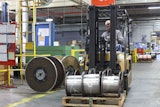Ro Khanna spent two years as deputy assistant secretary of the U.S. Department of Commerce, where he worked with the country’s most influential business and labor leaders to rebuild the nation’s manufacturing sector and increase America’s exports. Khanna is now a visiting lecturer in the Department of Economics at Stanford University and a technology attorney. He recently discussed his new book, Entrepreneurial Nation; and discussed what manufacturers can learn from the aerospace industry, why Solyndra is not a U.S. solar manufacturing failure, and what he sees for the future of American manufacturing.
Q: What prompted you to write this book?
A: I was surprised to learn that America is still a world leader in manufacturing. We are neck and neck with China. We produce about 20 percent of the world's goods with only 10 percent of our economy. China produces about 20 percent with nearly 40 percent of its economy. We have a comparative advantage in that American workers are nearly six times as productive as Chinese workers and when it comes to advanced manufacturing—aerospace, precision parts, chemicals, medical equipment—America can still be a world leader.
Q: Why is manufacturing sill the key to America’s future?
A: It is key for several reasons: First, manufacturing is tied to innovation. It is impossible to separate design from production—a nation needs to retain a certain production capacity to be able to help launch new products. Second, we need to increase our manufacturing base to lower our trade deficit. Almost 70 percent of world trade is still in manufactured goods. Finally, manufacturing provides a pathway to the middle class for nearly 12 million Americans. Manufacturing jobs pay, on average, better than service jobs, and they have a multiplier job creation impact.
Q: What can U.S. manufacturers learn from the U.S. aerospace manufacturing industry?
A: Great question. Aerospace is really the model. We lead the world in aerospace manufacturing, and we actually have a trade surplus when it comes to aerospace manufacturing. One of the central hubs is in Wichita, Kansas. In my book, I go into great depth about why Wichita, Kansas is so successful in aerospace manufacturing. But the central takeaway is that there is a regional partnership between government, the private sector, and educational institutions that helps create a great business climate and also prepares a skilled workforce.
Q: Why should Solyndra’s failure not be seen as a failure of the American solar industry?
A: Solyndra failed largely because of Chinese dumping and executive mismanagement. But, one failed company does not define an industry. The United States has new technology that is superior to the silicon crystalline used in China. The new CIGS technology for solar is promising, but it will take years to make it economical. We can only compete with China if we are pushing the technological boundaries in solar and staying one step ahead. We have to take risks, but, ultimately, that’s why America also leads in innovation.
Q: What do you think the landscape of U.S. manufacturing will look like in the future?
A: Advanced manufacturing has a very promising future in the United States. We need to focus on making products in a more innovative and efficient way and customizing them to meet consumer needs. To do this, we have to upgrade the skills of our workforce. We need to invest in our community colleges and also provide vocational education in our schools, particularly focusing on math and science. We need to have the right tax incentives and streamlined bureaucracy to make it easy to set up factories in the United States. Finally, we need to have the right immigration policies to keep job creators and entrepreneurs on our shores.























